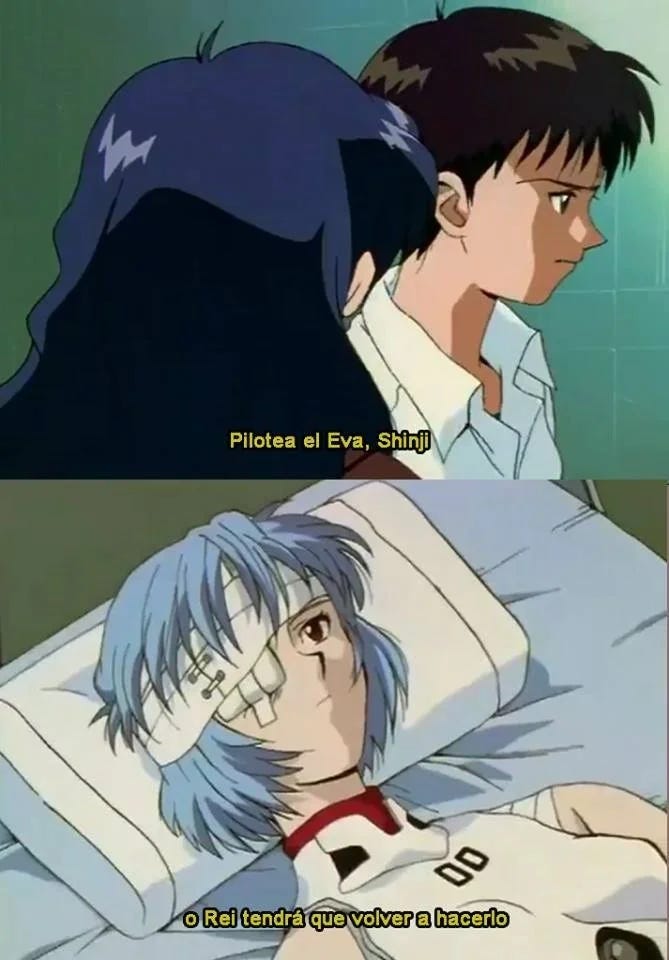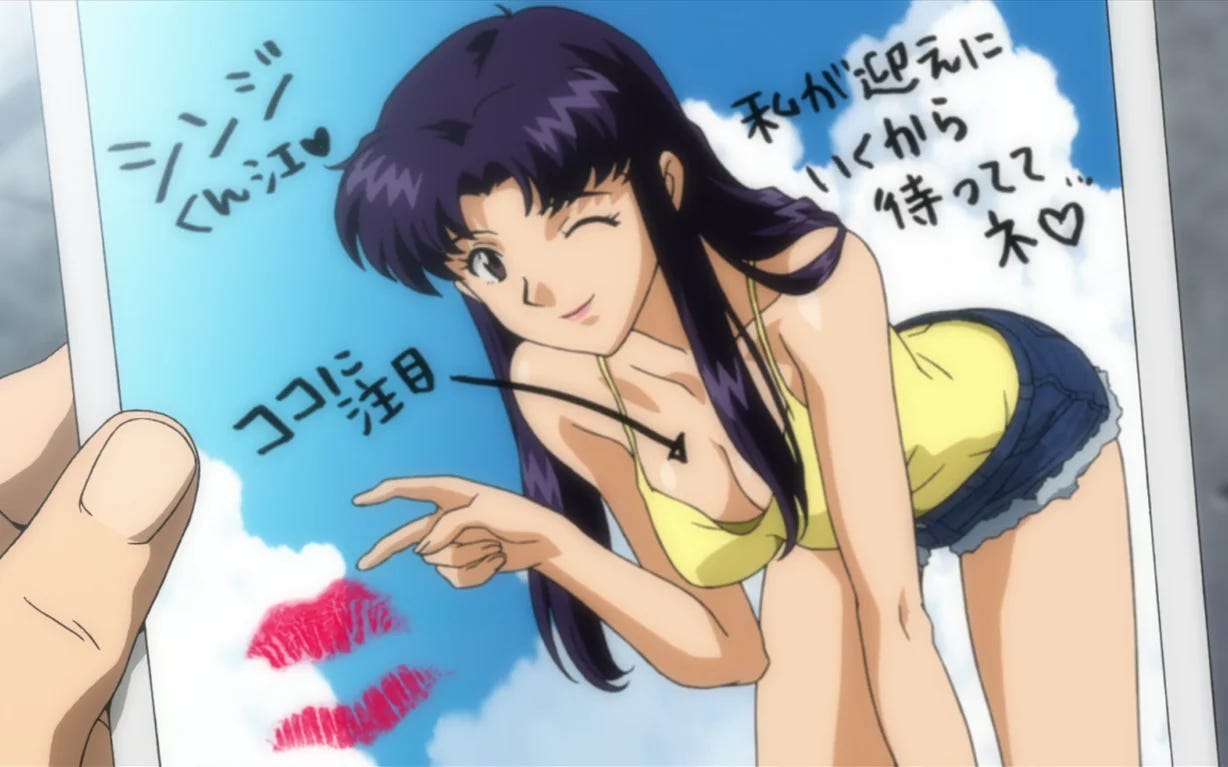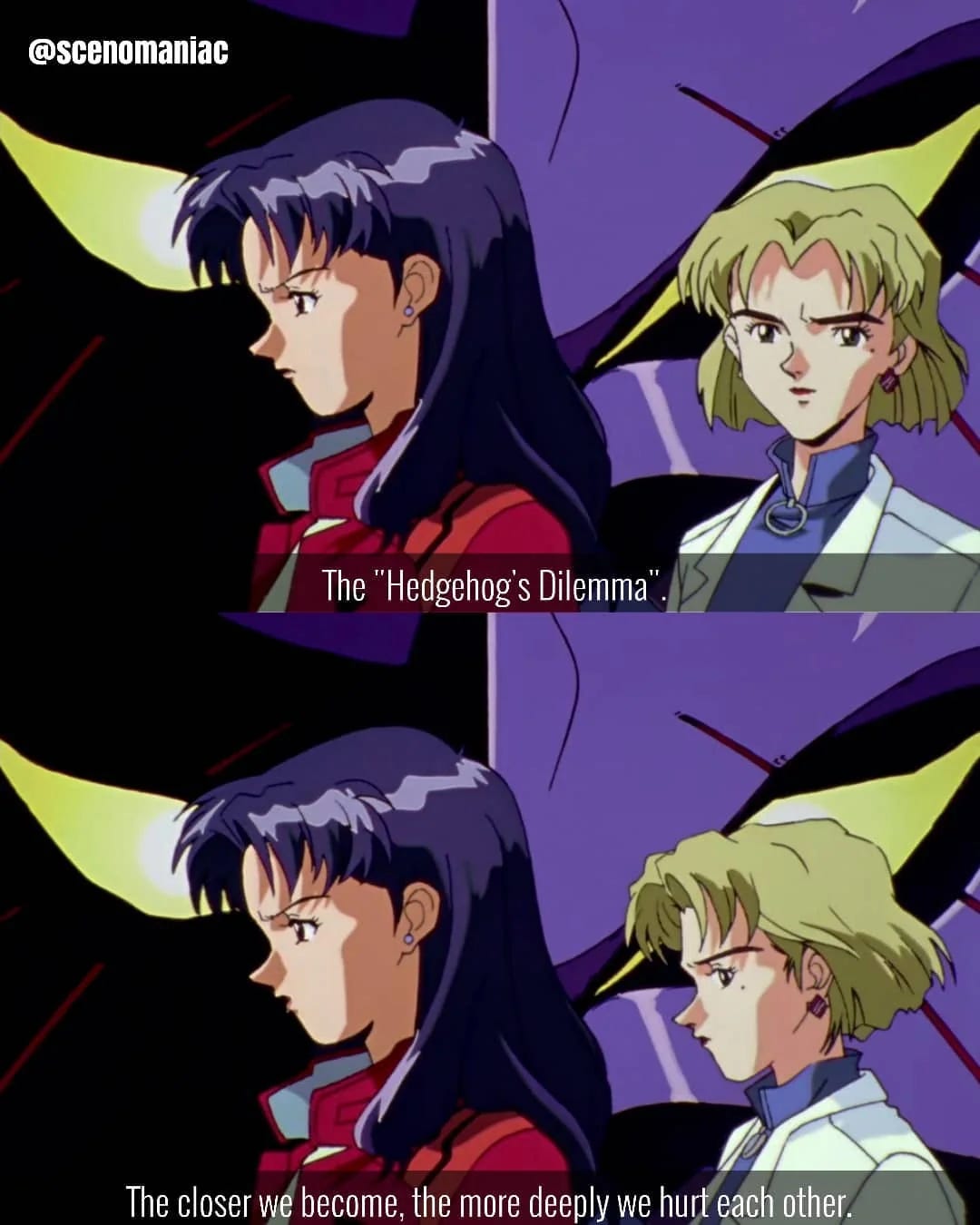Neon Genesis Evangelion is perhaps the most praised anime of all time, a staggering pinnacle of the medium beloved by fans from seemingly all walks of life, but it’s a work I’ve always, always struggled with.
I wish I could just dismiss Evangelion. “Oh, it’s overrated.” “Oh, it’s not for me.” But that’s never worked — I’ve never been able to shake the damn show. So many friends, critics, and creators whose opinions I respect just adore Evangelion, see themselves in it, have learned so much from it. I want to see what they see in it! Against such a monolithic pop culture presence I’m kind of helpless — if I don’t like Evangelion, the problem must be me, right?
It doesn’t help that my own experiences with Evangelion have led me to near-panic attacks; it wasn’t just that I didn’t like Evangelion, it’s that I fucking despised it. Seriously, in this very newsletter I once published a piece entitled “Evangelion Is My Supervillain Origin Story,” and looking back at that piece now, nearly three years later, even I’m surprised by the level of vitriol I was spitting. I’m generally not one to say that a piece of art making you angry makes it worthwhile, but in this case, Evangelion has clearly affected me on an emotional level to such a degree that it fascinates me just as much as it repels me. There’s something there, just out of grasp, continually eluding me.
I guess that’s why, every few years or so, something makes me want to give Evangelion another chance.
This time, it’s a video from anime YouTuber TotallyNotMark, a nearly two and a half hour epic that not only brilliantly examines the show’s themes, plot, and character work, but also bravely and poignantly digs into how Evangelion has helped him learn more about himself, his life, and his relationships with others. Seriously, it’s a brave video, one worth checking out even if you don’t particularly care all that much about Evangelion.
Mark’s experience with Evangelion is the kind of experience I’ve always wanted to have with Evangelion. Despite myself, I can’t help but be a little jealous. Despite myself, I can’t help but want to give it another shot.
The video also made me realize something; I haven’t actually revisited the original anime in quite some time. Mark covers only the original 26 episode Neon Genesis Evangelion anime, which aired in 1995-1996, and its direct follow-up film, End of Evangelion. I’ve seen a significant chunk of these episodes, but not since High School1, and never all in a row, from start to finish. In fact, my more recent experiences with Evangelion, the ones that traumatized me so, have all been with the Rebuild movies, a series of four films released between 2009 and 2021 that aim to retell the story of Evangelion, but quickly spin off the rails into their own entirely new take. I felt like I owed it to both myself and the original anime to give it one more shot.
And since I’ve publicly slandered and explored my relationship with Evangelion here on this newsletter in the past, it’s also the perfect place to chronicle this journey to, once and for all, see if I can understand and appreciate Neon Genesis Evangelion. I imagine we’ll explore 2-3 episodes per installment, and I assure you, with much less preamble moving forward. I’m psyched to get to share this with you, to see if I can finally find the brilliance in Evangelion, or if it’s truly the nihilistic, hateful story I’ve long suspected it to be.
Before we move forward, here’s your semi-annual that Evangelion has one of the All-Time greatest theme songs, not just in anime, but in television in general. A top notch banger.
Of course, the lyrics — which promise “the boy” that he will become “a legend” — feel ironic and cruel, like they’re written about the kind of prototypical mecha protagonist Evangelion is deconstructing, not poor doomed Shinji Ikari.
Episode 1: Angel Attack
Episode 2: Unfamiliar Ceilings / The Beast
Episode 3: The Silent Phone / A Transfer
“Pilot the Eva, Shinji. Or else Rei will have to do it again.”
It’s probably the most famous moment in Evangelion, a scene that has transcended the bounds of the series — and anime fandom itself — to become a full-on meme. As it turns out, it’s also a scene I’ve been completely misunderstanding/misremembering for probably decades now.

In my memory, this scene played out later in the series. Shinji was trying to quit, trying to get out of piloting the Evangelion, and Rei — his friend, near death— was being trotted out to shame Shinji into just doing his damn job. It fits with the general narrative that seems to surround Shinji in many Eva fan communities — that he’s a whiny baby who is always trying to run away and just needs to shut up and get in the robot. Imagine my shock, then, when this scene shows up in the very first episode.
That context changes everything. Shinji isn’t trying to quit or run away — he’s a scared 13-year-old kid being asked to pilot a robot the size of a building against an unknowable supernatural threat capable of devastating entire cities, and not only does he have zero experience, he didn’t even known the Evangelions existed until mere moments ago. Of course he’s scared! Of course he doesn’t want to do it! It’s the only logical response!
As for Rei, she isn’t a friend at all — she’s a total stranger! To me, that makes Shinji’s actions all the more laudable, outright heroic. He decides to pilot this robot, fight this monster, with no experience and no real chance of winning, to save the life of one complete stranger.
How is Shinji a coward, exactly?
***
As I laid out pretty clearly in my “Evangelion Is My Supervillain Origin Story” piece, the thing about this show that has always soured me on it is its treatment of its protagonist, Shinji — not just the way the entire cast relentlessly bullies him, but the way the fanbase and the writers of the series itself seem to outright hate him. And while I certainly want to try to appreciate all aspects of Evangelion during this project, I’m naturally going to be viewing the series through this lens, trying to once and for all come to a decisive conclusion about the character. And in that sense, there’s a lot to talk about in these first three episodes.
It’s notable to me that in the first two episodes Shinji’s handlers, Misato and Ritsuko, mostly seem to know that they’re being harsh and unreasonable with Shinji, and that it appears to be a tough love strategy; they talk differently about Shinji when he isn’t around, more sympathetic, but they know they need him to cooperate to save the world, and are willing to be tough on him, to push him, to be the bad guys if necessary, if it means achieving their goals. That’s characterization I can understand and appreciate.
What I had trouble buying, though, was all the talk about Shinji’s “choice” to come to Tokyo-3, his “reason” for making the move.
I know, I know, the reasons each young pilot have to pilot their Evas are a major part of the series’ themes, and Shinji’s own reason — wanting to impress his monstrous distant father, Gendo — makes a lot of sense. But…nothing else about this scenario does.
First of all, Misato and Ritsuko ask Shinji why he even bothered coming if he wasn’t going to pilot the Eva when they damn well know he had no idea why he was being summoned — it’s disingenuous in the most frustrating way.
But more than that, I just don’t buy that Shinji had a choice to come at all. We don’t know much about Shinji’s life between the time his father left him and the time he came to Tokyo-3 other than that Shinji lived alone and went to school, but it seems pretty obvious that Shinji, at age 13, wasn’t entirely independent and self-sustaining, right? As monstrous as Gendo is, I have to assume he was at the very least paying Shinji’s rent and, like, keeping a bank account stocked for Shinji to buy groceries, right? So what happens if Gendo summons Shinji and he doesn’t come? Will there be consequences? Can he go on living alone? Sure, I guess it was Shinji’s “choice” to come to Tokyo-3 in the sense that nobody physically forced him to board a train, but it doesn’t actually feel like he had much of a choice at all. I just don’t buy it. And that’s frustrating, because it not only makes the attitude other characters take with him feel especially cruel, but it makes it difficult for me to fully invest on one of the series’ core themes.
*Sigh*

***
The third episode, “The Silent Phone / A Transfer,” is easily my favorite installment I watched for this piece. The themes ring true, and every character feels flawed and relatable in equal measure.
This is the episode that introduces the idea of the “Hedgehog’s Dilemma,” a core piece of Eva lore that posits that hedgehogs have trouble getting close to each other, because when they do, their quills get in the way. It means that getting close to people often means having to endure some pain, and in Evangelion, almost every character lets the fear of this pain drive them away from forming real human connections.
In episode 3, we meet Toji, a classmate of Shinji’s whose sister was badly injured in the battle between Shinji and the Angel in episode 1. When Toji discovers that Shinji was piloting the Evangelion, he beats Shinji up, but later finds himself accidentally sharing a cockpit with Shinji and seeing the terror that goes into piloting the Eva, the toll it takes on Shinji. Toji has empathy for Shinji now, but though he spends the final moments of the episode attempting to apologize to Shinji, in the end, he just can’t do it, and Shinji’s phone remains silent. He’s so close to making a connection, but just can’t find the courage to follow through.
This is the moment that hammered home for me what Evangelion is trying to say about humanity, that we’re all just a bunch of flawed beings yearning for connection but terrified of the potential pain pursuing it could bring, and I think that’s going to be an incredibly useful tool to view these characters through moving forward.
ABOUT
“Do You Know What I Love the Most?” is a newsletter from Spencer Irwin about his relationship with the stories he loves. Spencer is an enthusiast and writer from Newark, Delaware, who likes punk rock, comic books, working out, breakfast, and most of all, stories. His previous work appeared on Retcon Punch, One Week One Band, and Crisis on Infinite Chords, and he can be found on Twitter at @ThatSpenceGuy. If you like this newsletter, please subscribe and share with your friends!
About 20 years ago now, if you must know >:/




